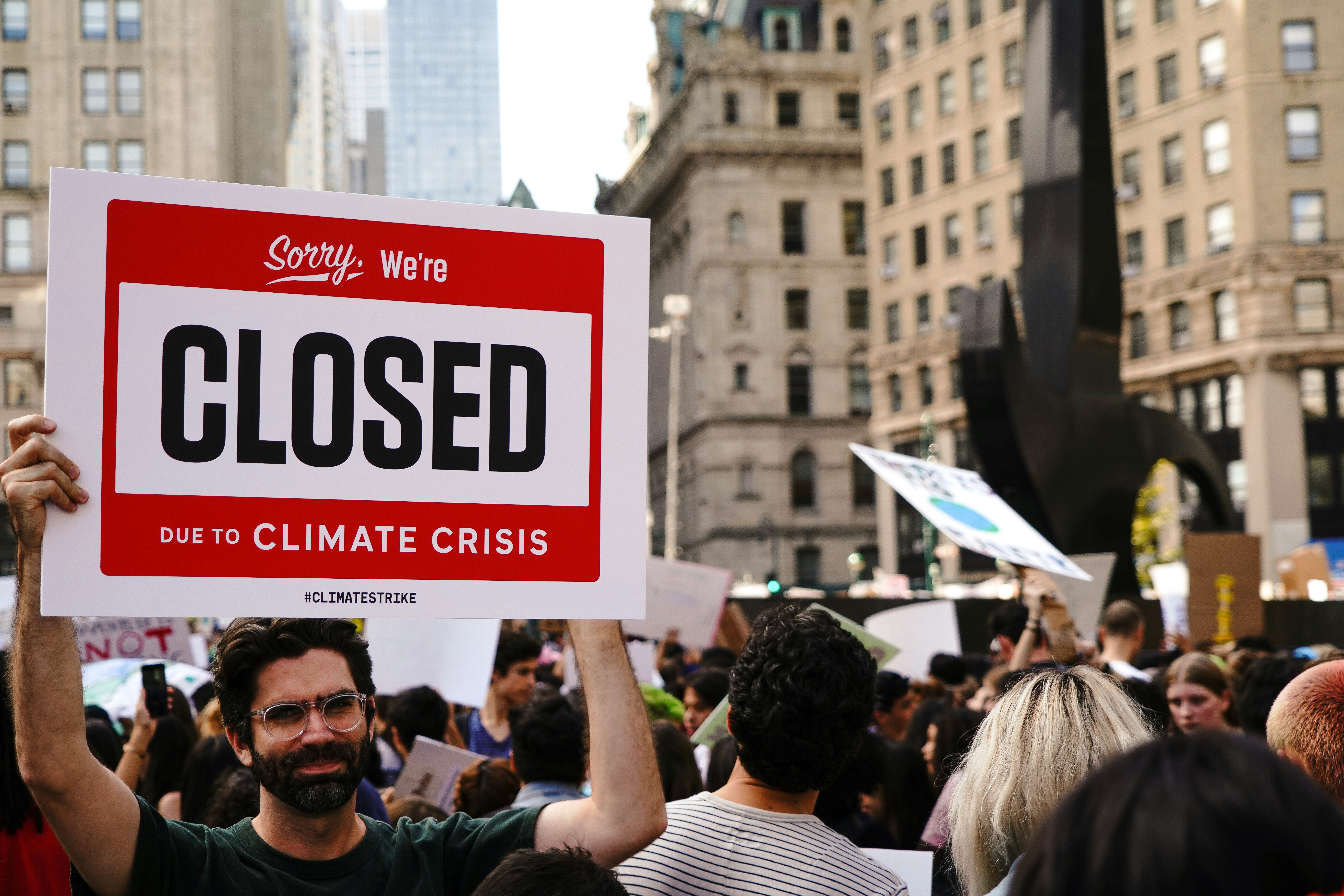Understanding Climate Anxiety
Climate anxiety refers to the psychological distress that arises from the concern over climate change and its implications. It is characterized by feelings of fear, helplessness, and overwhelm regarding the future of the planet and the well-being of upcoming generations. This phenomenon has garnered considerable attention, particularly among younger individuals, notably Generation Z, who are acutely aware of the severe consequences of environmental issues.
Symptoms of climate anxiety can manifest in various ways, including persistent worry about environmental disasters, heightened sensitivity to news about climate change, and feelings of despair over the perceived lack of progress. Gen Z, having grown up in an era where the discourse surrounding climate change is prevalent, often feels a unique burden. They are not only inheriting a climate crisis but are also urged to take immediate action to combat it, fostering a dual sense of responsibility and anxiety.
The psychological impact of climate change is exacerbated by the constant stream of information and media coverage regarding environmental degradation. Social media, in particular, has become a double-edged sword; while it serves as a platform for activism and awareness, it can also inundate young individuals with alarming reports that heighten feelings of eco-stress. This barrage of information can lead to a disabling sense of helplessness, as many Gen Z members grapple with the notion that their individual efforts may be insufficient in combating such a pervasive issue.
Moreover, the existential threats posed by climate change further complicate mental health. Young people experience a profound concern for their future and the world they will inhabit. The psychological ramifications of feeling powerless to influence climate change outcomes can lead to increased anxiety, depression, and a sense of disconnection from a hopeful future.
The Scope of Eco-Stress in Gen Z
Climate anxiety, or eco-stress, has emerged as a significant concern for Generation Z, reflecting their deepening awareness of environmental changes and sustainability issues. Numerous studies illustrate how this demographic feels an acute sense of worry regarding the ecological state of the planet. According to a report from the American Psychological Association, approximately 70% of Gen Z individuals report experiencing climate anxiety, a striking figure that underscores the prevalence of these concerns among younger generations. As these individuals grapple with their futures, it becomes crucial to understand the specific types of environmental issues that resonate with them most deeply.
One prevalent source of eco-stress among Gen Z stems from the increasing frequency and intensity of wildfires. Findings from a 2022 survey reveal that over 60% of those interviewed identified wildfires and their devastating impact on ecosystems as significant environmental anxieties. Coupled with this is the rising concern over sea levels; projections indicate that rising water levels threaten coastal communities, contributing to a pervasive sense of instability and fear about housing and heritage. Furthermore, biodiversity loss, facilitated by habitat destruction and climate change, intensifies feelings of eco-stress. This generation sees the significant decline in wildlife populations and plant species as indicative of larger systemic failures that could endanger life on Earth.
These environmental worries significantly shape Gen Z’s worldview, influencing their personal and professional aspirations. Many individuals in this generation feel an urgent responsibility to advocate for systemic changes that encompass sustainable practices and environmental justice. Education and awareness about these pressing issues have become fundamental, prompting proactive measures aimed at confronting climate change. In essence, eco-stress has evolved into a defining characteristic of being Gen Z, perpetuating a cycle of concern that drives both anxiety and action.
Coping Mechanisms: Individual Approaches
As climate anxiety becomes increasingly prevalent among Gen Z, individuals are exploring various coping mechanisms to manage their eco-stress. Many young people are turning towards mindfulness practices as a way to cultivate a sense of presence and calm amidst the overwhelming feelings associated with climate change. Mindfulness involves techniques such as meditation, deep-breathing exercises, and yoga, which can assist individuals in grounding themselves and finding inner peace. For instance, through meditation, many practitioners report a heightened awareness of their thoughts and emotions, allowing them to better manage anxiety levels.
Another growing trend among Gen Z is eco-therapy, which emphasizes the therapeutic benefits of nature. By engaging with the environment, whether through hiking, gardening, or simply spending time outdoors, individuals can reconnect with the natural world, enhancing their emotional well-being. For example, some young people share their experiences on social media, detailing how spending time in lush landscapes or caring for plants has helped alleviate feelings of despair regarding climate issues. Such activities provide a sense of agency and remind them of their connection to the earth, fostering a positive perspective.
In addition to these approaches, self-care routines play a significant role in managing climate anxiety. Gen Z often incorporates activities such as journaling, artistic expression, or physical exercise into their daily lives, which can serve as powerful outlets for processing emotions related to environmental distress. These creative outlets enable young individuals to express their concerns constructively while also promoting mental health. By taking proactive steps to engage in personal care and well-being, many members of Gen Z report feeling more resilient in the face of ecological threats.
🛡 Powerful Protection Spells That Shield From Harm
Safeguard yourself, loved ones, and your home from negative energy and spiritual threats with effective, trusted protection spells.
Ultimately, the diverse coping strategies employed by Gen Z illustrate a collective effort to address and manage climate anxiety effectively. Through mindfulness, eco-therapy, and self-care, young people are forging their paths toward emotional balance while grappling with the demands of an uncertain future.
Collective Action and Activism
The growing trend of climate anxiety among Generation Z has catalyzed a wave of collective action and activism. Recognizing the urgent need for environmental change, many young individuals channel their eco-anxiety into meaningful initiatives that advocate for sustainability and climate justice. This generational response is not merely a reaction to the overwhelming data on climate change; it represents a strategic and organized effort to enact change on both a local and global scale.
One of the most prominent expressions of this activism is seen through climate strikes, which have garnered significant media attention and participation worldwide. Inspired by the Swedish activist Greta Thunberg, millions of young people have rallied on streets during events like the Global Climate Strike, demanding urgent action from governments and corporations. These gatherings are not only acts of protest; they serve as platforms for education and solidarity, allowing individuals to connect over shared concerns for the planet’s future.
In addition to organized strikes, Generation Z is increasingly involved in grassroots sustainability projects that aim to foster a healthier relationship between humans and the environment. Initiatives range from community gardens to clean-up drives that seek to reduce local pollution and promote biodiversity. These projects often leverage social media, functioning as both a tool for mobilization and a means of creating community. Platforms like Instagram and TikTok have become vital for raising awareness, sharing progress, and inspiring others to participate in the movement.
The sense of community that arises from these collective actions is significant, allowing individuals to feel less isolated in their eco-anxiety. Participation in activism provides an avenue for people to harness their concerns into actionable steps, fostering resilience among youth faced with the daunting realities of climate change. By engaging in collective efforts, Gen Z not only targets systemic issues but also cultivates a hopeful narrative for the future of the planet.
The Role of Education and Awareness
Education serves as a fundamental pillar in equipping Generation Z with the necessary knowledge to confront climate change and its associated anxieties. As young individuals increasingly express concern about the state of our planet, educational initiatives—both formal and informal—play a vital role in fostering a more profound understanding of environmental issues. Schools have begun to incorporate climate science into their curricula, ensuring that students not only learn the facts surrounding climate change but also engage in discussions about its implications for the future. This educational approach allows Gen Z to grasp the urgency of climate action and its potential impact on their lives.
Furthermore, community-based workshops and outreach programs augment formal education by providing real-world perspectives on sustainability practices. These programs often involve local experts and activists who can offer practical advice on minimizing one’s carbon footprint, and they serve to inspire youth to take collective action within their communities. Informal learning platforms, such as online courses and webinars, also play an essential role in expanding knowledge on climate-related topics. These resources empower young people to seek additional information at their discretion, further mitigating feelings of eco-anxiety through increased understanding and agency.
Moreover, educational campaigns can help demystify complex issues surrounding climate change, making them more accessible to the younger generation. Social media has enabled the rapid dissemination of information, encouraging peer-to-peer learning and discussions about environmental stewardship. This blend of traditional and innovative educational methods not only informs Gen Z about climate science but also nurtures resilience and adaptive coping mechanisms in response to eco-stress. By prioritizing education and awareness, society can ensure that young individuals are not only informed but also motivated to contribute towards sustainable practices, ultimately shaping a healthier relationship with the environment.
The Importance of Connection with Nature
In recent years, the significance of connecting with nature has gained recognition, particularly among Generation Z as a therapeutic response to climate anxiety. With the increasing prevalence of eco-stress, young individuals find solace in natural surroundings, seeking refuge from the chaos and uncertainty precipitated by climate-related concerns. Engaging in outdoor activities such as hiking, gardening, and wildlife conservation provides not only physical benefits but also profound psychological effects that can alleviate the symptoms of anxiety.
Hiking, for instance, allows individuals to immerse themselves in stunning landscapes, promoting both physical fitness and a sense of adventure. Research has shown that outdoor activities can lead to lower levels of cortisol, a hormone associated with stress, while simultaneously enhancing mood and emotional well-being. The rhythmic patterns of walking through nature foster mindfulness, drawing individuals away from ruminative thoughts and allowing them to engage in the present moment.
Explore Our Powerful Magic Spells
Choose a spell that suits your needs and experience real results today!
Moreover, gardening fosters a unique bond with the earth, offering therapeutic benefits through the act of nurturing. This hands-on activity enables young people to witness the growth of plants, reinforcing a sense of hope and connection to the cyclical nature of life. Furthermore, the satisfaction derived from growing one’s own food or beautifying a space contributes to feelings of accomplishment and self-efficacy, which can counteract feelings of despair or helplessness stemming from eco-anxiety.
Wildlife conservation efforts also attract Gen Z, as they channel their passion for the environment into tangible action. Participating in these initiatives not only allows them to contribute positively to ecological health but also fosters a sense of community and shared purpose. Studies indicate that individuals involved in such activities often report higher levels of life satisfaction and emotional resilience.
Thus, amidst the rise of climate anxiety, connecting with nature emerges as a vital coping mechanism for Generation Z. By participating in outdoor activities, gardening, and conservation efforts, they cultivate a profound relationship with the natural world, ultimately enhancing their emotional well-being while addressing eco-stress.
The Influence of Technology and Media
In the modern age, technology and media have emerged as pivotal tools in shaping Gen Z’s response to climate anxiety. This generation, characterized by its digital fluency, utilizes various platforms to engage with environmental issues, thereby transforming how they process eco-stress. Social media outlets such as Instagram, TikTok, and Twitter serve not only as spaces for sharing personal concerns but also as venues for mobilizing collective action. Through hashtags and viral challenges, young activists can galvanize support and inspire societal change, creating a sense of community and shared responsibility.
Moreover, dedicated apps and online communities provide valuable resources for Gen Z individuals seeking to address their climate-related fears. Many of these platforms focus on eco-friendly lifestyle choices, offering tips for sustainable living and methods for reducing carbon footprints. This tailored content can empower young users, transforming feelings of helplessness into proactive measures while simultaneously fostering a sense of agency. However, the plethora of information available online can have a double-edged effect; while some content promotes hope and solutions, other narratives steeped in negative news can exacerbate feelings of anxiety.
The ongoing exposure to curated environmental content versus overwhelming reports of climate catastrophe leads to varied emotional experiences among Gen Z. Research indicates that while constructive discussions and awareness campaigns can alleviate some eco-stress, the constant stream of bad news may lead to a state of despair, hindering motivation for active change. Thus, the balance of information is crucial for maintaining mental well-being. The technology-driven engagement with climate issues not only influences how Gen Z copes with eco-stress but also shapes their outlook on the future of the planet as active participants in sustainable practices.
Seeking Professional Help
The rising phenomenon of climate anxiety among Generation Z has underscored the necessity of mental health support to cope with feelings of eco-stress. Eco-anxiety encompasses a variety of emotions including fear, helplessness, and grief related to the environment and the ongoing climate crisis. Recognizing the impact of these feelings, many young individuals are turning to mental health professionals for guidance and support. The acknowledgment that climate change poses not only physical threats but also emotional turmoil has led to a substantial increase in the demand for counseling services tailored to address eco-related mental health issues.
Professional help can take many forms, ranging from individual therapy to support groups that focus specifically on issues related to climate anxiety. Mental health professionals are increasingly aware of the existential dread fueled by climate change, and many are adapting their practices to include discussions around eco-anxiety. Therapists trained in eco-psychology or those who incorporate ecological themes into their sessions can provide a safe space for individuals to express their concerns and explore coping strategies. These specialists often emphasize the importance of not only processing emotions but also taking actionable steps toward environmental sustainability as a form of empowerment.
In addition to traditional therapy, various organizations are emerging that focus explicitly on climate-related anxiety. These services offer resources such as workshops, online support groups, and literature on coping with eco-grief. For instance, platforms that connect individuals with peers experiencing similar distress are becoming invaluable. Such initiatives encourage community engagement and shared experiences, allowing those afflicted by climate anxiety to feel less isolated. By accessing these resources, Generation Z can find pathways to resilience, fostering both individual well-being and collective action related to environmental advocacy.
Creating a Hopeful Future
As climate anxiety continues to affect the mental well-being of young individuals, particularly those in Generation Z, it becomes crucial to emphasize strategies that foster a hopeful outlook. Building resilience in the face of environmental uncertainty is not only essential for maintaining psychological health but also for empowering proactive engagement with climate issues. Many members of Gen Z are countering feelings of despair by cultivating optimism and embracing positive action.
One effective strategy involves participation in community-oriented initiatives which encourage collective impact. Collaborating with peers and local organizations on projects such as tree planting, community clean-ups, or sustainability education fosters a sense of purpose. This active involvement helps individuals recognize the power of their contributions, no matter how small, in combating climate change. By working towards tangible goals, Gen Z is developing a constructive mindset that can replace feelings of helplessness with agency.
Moreover, incorporating creativity into environmental advocacy enables young individuals to envision a future that embraces sustainability. Through art, music, and digital platforms, they express their concerns while simultaneously proposing innovative solutions. This creative outlet not only serves as a form of self-expression but also resonates with wider audiences, effectively raising awareness about pressing ecological issues.
Importantly, mental health resources and open dialogues about eco-stress can aid in alleviating anxiety. By supporting one another and sharing strategies to cope with the emotional toll of climate change, Gen Z can forge a united front. The intersection of personal well-being and environmental activism is a purposeful endeavor that emphasizes hope rather than despair. Ultimately, fostering resilience, optimism, and collective action empowers this generation to create a hopeful future amidst the challenges posed by climate change.







